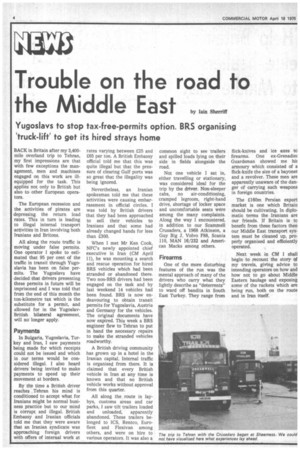Trouble on the road to
Page 6

If you've noticed an error in this article please click here to report it so we can fix it.
the Middle East by lait' Shertiff
Yugoslays to stop tax-free-permits option. BRS organising 'truck-lift' to get its hired strays home
BACK in Britain after my 3,400mile overland trip to Tehran, my first impressions are that with few exceptions the management, men and machines engaged on this work are illequipped for the task. This applies not only to British but also to other European operators.
The European recession and the activities of pirates are depressing the return load rates. This in turn is leading to illegal internal transport activities in Iran involving both Iranians and Britons.
All along the route traffic is moving under false permits. One operator I spoke to estimated that 95 per cent of the traffic in transit through Yugoslavia has been on false permits. The Yugoslays have decided that drivers presenting these permits in future will be imprisoned and I was told that from the end of this month the ton-kilometre tax which is the substitute for a permit, and allowed for in the YugoslavBritish bilateral agreement, will no longer apply.
Payments In Bulgaria, Yugoslavia, Turkey and Iran, I saw payments being made for which receipts could not be issued and which in our terms would be considered illegal. I also heard drivers being invited to make payments to speed up their movement at borders.
By the time a British driver reaches Tehran his mind is conditioned to accept what for Iranians might be normal business practice but to our mind is corrupt and illegal. British Embassy and Iranian officials told me that they were aware that an Iranian syndicate was approaching foreign drivers with offers of internal work at rates varying between £25 and £65 per ton. A British Embassy official told me that this was quite illegal but that the pressure of clearing Gulf ports was so great that the illegality was being ignored.
Nevertheless, an Iranian spokesman told me that these activities were causing embarrassment in official circles. I was told by British drivers that they had been approached to sell their vehicles to Iranians and that some had already changed hands for less than £300.
When I met Mr Ken Cook, NFC's newly appointed chief executive in Iran (CM April 11), he was mounting a search and rescue operation for hired FIRS vehicles which had been stranded or abandoned there. Two non-BRS drivers had been engaged on the task and by last weekend 14 vehicles had been found. BRS is now endeavouring to obtain transit permits for Yugoslavia, Austria and Germany for the vehicles. The original documents have now expired. This week a BRS engineer flew to Tehran to put in hand the necessary repairs to make the stranded vehicles roadworthy.
A British driving community has grown up in a hotel in the Iranian capital. Internal traffic is organised from there. It is claimed that every British vehicle in Iran at any time is known and that no British vehicle works without approval from this quarter.
All along the route in laybys, customs areas and car parks, I saw tilt trailers loaded and unloaded, apparently abandoned. These trailers belonged to ICS, Rentco, Eurofleet and Flexivan among others, and were on hire to various operators. It was also a common sight to see trailers and spilled loads lying on their side in fields alongside the road, Not one vehicle I sat in, either travelling or stationary, was considered ideal for the trip by the driver. Non-sleeper cabs, no air-conditioning, cramped legroom, right-hand drive, shortage of locker space and uncomfortable seats were among the many complaints. Along the way I encountered, in addition to our Scammell Crusaders, a 1968 Atkinson, a Guy Big J, Volvo F88, Scania 110, MAN 16/232 and American Macks among others.
Firearms
One of the more disturbing features of the run was the mental approach of many of the drivers who carry what they lightly describe as "deterrents" to ward off bandits in South East Turkey. They range from flick-knives and ice axes to firearms. One ex-Grenadiei Guardsman showed me his armoury which consisted of a flick-knife the size of a bayonet and a revolver. These men are apparently unaware of the danger of carrying such weapons in foreign countries.
The £160m Persian export market is one which Britain should be cultivating. In diplomatic terms the Iranians are our friends. If Britain is to benefit from these factors then our Middle East transport system must be cleaned up, properly organised and efficiently operated.
Next week in CM I shall begin to recount the story of my travels, giving advice to intending operators on how and how not to go about Middle Eastern haulage and exposing some of the rackets which are being run, both on the route and in Iran itself.








































































































































